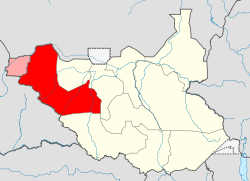IOM hands over rehabilitated primary school in W. Bahr el Ghazal
August 10, 2022 (WAU) – The International Organization for Migration (IOM) on Monday handed over a primary school that was rehabilitated under the Enhancing Community Resilience and Local Governance Project (ECRP).
The agency, in a release, said rehabilitation works on the school started early this year after the Wau North Payam Development Committee (PDC), comprised of representatives from each Boma development committee in the payam, identified rehabilitation of Janain Primary School as one of their priority development objectives.
Janain Primary School is located in Hai Fahal, a highly multicultural community which is home to persons from different social, cultural, and ethnic groups, many of whom fled their former communities during the war.
Under the supervision of ECRP’s technical teams, contractors constructed a wall around the school, one block of two classrooms and a gender segregated latrine that also accommodates needs of persons with disabilities.
Over 350 students, community members, returnees and internally displaced persons will reportedly benefit from this newly rehabilitated infrastructure.
Speaking at the handover of the school event on Wednesday, Esterina John, the head mistress at the school, expressed her happiness about the project.
“I am excited that my school has seen this rehabilitation. The classes are looking beautiful. My pupils will be protected inside this wall from anything bad that could harm them while at school and their concentration in class will be focused,” she said.
South Sudan is home to more than 2.8 million children, over 70% of whom are out of school. Furthermore, most of those who are in school do not have access to the school infrastructure that is essential for effective teaching and learning to take place.
The ECRP, through the leadership and commitment of the local government and community, strives to address this issue in Hai Fahal and other ECRP-selected communities where PDCs have chosen school infrastructure projects through the rehabilitation of schools.
As such, ECRP reportedly seeks to maximise the impact of school construction and rehabilitation by also ensuring the sustainability of the schools through a strong focus on government and community led operation and maintenance, as is critical for all types of infrastructure built under ECRP.
So far, ECRP has handed over nine infrastructure subprojects in Wau and Raja Counties, including health facilities, schools, and water yards. In the coming weeks, IOM will be handing over more infrastructure subprojects in Wau and other parts of the country where the project is operating.
ECRP, funded by the World Bank and implemented by the United Nations Office for Project Services (UNOPS) and IOM on behalf of the Government of South Sudan, seeks to strengthen the capacity of local governance and community level institutions, and build infrastructure to address gaps in basic services in 20 counties across ten states in South Sudan.
(ST)

